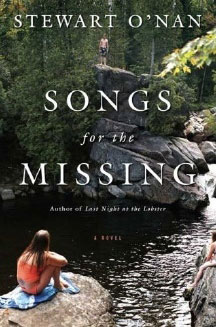 |
 Stewart O'Nan
Stewart O'Nan
Songs for the Missing
Reviewed by: Rick Kleffel
© 2008
Viking / Penguin Putnam
US First Edition Hardcover
ISBN 978-0-670-02032-4
Publication Date: 10-30-2008
289 Pages; $25.95
Date Reviewed: 11-22-08
Index:
General Fiction
Mystery
We like to think of ourselves as whole unto ourselves. We're each our own person, separate and individual, forging our way through the lives of others. We also know that's not true in the least, but sometimes it takes a tragedy to demonstrate that truth. Stewart O'Nan, a consummate composer of American novels, takes us into the lives of the family and friends of a young woman who disappears, to explore who they become in the aftermath of her disappearance. 'Songs for the Missing' is indeed a complex series of plainsongs, a carefully interwoven tale of slow despair, carefully crafted tension and radiant hope. Hope itself is a necessity, because what we hope for may never come to pass; resolution may escape us. And when we lose someone, we'll change in waysd we can't possibly predict.
Kim Larsen is an average teenager working at a convenience store in a scenic small town by a lake in the midwest. Her father, Ed, is a realtor, her mother, Fran, works at the hospital and her little sister Lindsay is perhaps not as beautiful as Kim, but she's clearly quite bright. Kim leaves work one day and never returns or appears in the novel after page seven.
The bulk of 'Songs for the Missing' is devoted to the characters of Kim's family and her closest friends and what becomes of them as they search for her and are gradually forced to accept that they may never learn what became of her. It involves some elements of crime fiction, but they’re sparingly rendered in the background. In the days, weeks, months and years that follow, each character is forced to re-define their lives and themselves in terms of Kim's disappearance. Some become stronger, some dissolve and some stay what readers may surmise is pretty much the same. But in the course of the novel, these people become our family, our friends. O'Nan takes us into their lives and make their lives ours.
His approach presents him with some serious challenges. On one hand, he does have abuilt-in tension generator to keep the pages turning; what happened to Kim Larsen? But that's not the question he's interested in answering, nor is the question that gets answered. Instead, this novel is about what becomes of those who knew her, or thought they did, when she's removed from the equation. O'Nan is very precise, and there is a lovely, complex human mathematical solution to this novel. He understands and lives in his characters so easily and so well that we can see the inevitable paths they will take only as they take each step down those paths. The plot is not a series of events, but rather a series of character perceptions, like Marcel Duchamps' Nude Descending a Staircase. Perfect moments in time, carefully selected and rendered with pristine precise prose.
O'Nan's vision of America straddles the line between the universal and the individual with deceptive ease. He offers enough detail to embed the reader in the everyday and not-so everyday lives of his characters, but not so much as to become distracting. He also knows how to expertly balance his novel, to keep his characters fresh and enjoyable so that no matter whose eyes were seeing through or taken to, we're always compelled by what we're shown. He explores the subculture of the missing with enough compassion to create sympathy, but carefully avoids exploiting the more bathetic opportunities presented by reality itself. He knows when to show us more than we might see were we there, and when to show us less.
Readers expecting lots of crime fiction television drama details may be disappointed until they realize they're caught in the characterizations. This is a literary novel that deals in the stuff of crime fiction, not a literary crime fiction novel. The distinction may be subtle but it is important. 'Songs for the Missing' is ultimately not about the missing, or what happens to those who are taken. It's a novel about the heroic efforts we have to make to live through every day, with or without those we love in our lives. Heroism, in O'Nan's novel, is not about big events. It's about small lives, well-lived. You may think that the life you live is your own. But you're living numerous lives; and you may not know this until one of them is removed. Are you less of a person when someone goes away? No, but the shape of you changes. The shape of your life changes, without your permission.
|
 |
